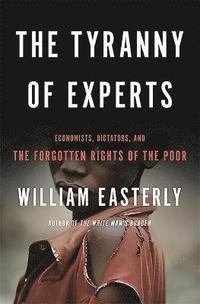
- Format
- Häftad (Paperback / softback)
- Språk
- Engelska
- Antal sidor
- 416
- Utgivningsdatum
- 2015-03-24
- Förlag
- Basic Books
- Dimensioner
- 206 x 137 x 33 mm
- Vikt
- Antal komponenter
- 1
- Komponenter
- ,
- ISBN
- 9780465089734
- 454 g
The Tyranny of Experts
Economists, Dictators, and the Forgotten Rights of the Poor
Slutsåld
Kundrecensioner
Fler böcker av William Easterly
-
The White Man's Burden
William Easterly
-
White Man's Burden
William Easterly
-
Economics of International Development: Foreign Aid versus Freedom for the World's Poor
William Easterly, Sylvie Aboa-Bradwell, Christian Bjornskov, Abigail Hall-Blanco
Recensioner i media
Wall Street Journal 2014 Books of the Year New York Times Book Review "Bracingly iconoclastic... Easterly's stories unfailingly reinforce a select number of crucial themes, the boldest being that the people of the so-called underdeveloped world have been systematically betrayed by the technocrats in charge of the global development agenda." Bloomberg View "[Easterly] is one of the most consistently interesting and provocative thinkers on development." Times of London "This powerful polemic against top-down aid projects convinces." Shelf Awareness for Readers "Easterly makes essential points about human rights, the need to accommodate local factors in developing countries and the terrible mistakes that can result from deals with corrupt regimes or self-interested organizations. His argument is made with passion and ample illustration." Kirkus "Easterly delivers a scathing assault on the anti-poverty programs associated with both the United Nations and its political and private sector supporters...A sharply written polemic intended to stir up debate about the aims of global anti-poverty campaigns." Angus Deaton, Professor of Economics and International Affairs, Princeton University "Knowledge and expertise are fountainheads of prosperity and freedom, yet experts, especially foreign experts, have frequently been instruments of the very oppression that they seek to alleviate. The Tyranny of Experts tells the extraordinary story of authoritarian development. Those not familiar with Easterly's previous books are in for a revelation, and the many long time aficionados will be delighted to be back in the hands of the master." Paul Romer, New York University "Easterly's new book shows that the expert approach to development rests on an engrained but unexamined premise: that people in poor countries cannot be trusted to make their own decisions. As this wide-ranging and compelling account shows, this assumption is doubly flawed. It's morally offensive and a sure guide to bad policy." Francis Fukuyama, Olivier Nomellini Senior Fellow at the Freeman Spogli Institute for International Studies at Stanford University "Bill Easterly is simply the most interesting and provocative economist writing on development topics today." Library Journal "Easterly's research may help start a dialog about identifying better methods for alleviating global poverty and should assist readers interested in humanitarian efforts who want to draw their own conclusions about how to aid the world's poor." Nancy Birdsall, President, Center for Global Development "This book is deeply radical and thought-provoking, and brilliantly entertaining. Easterly invokes Kahneman, Hayek, Hirschman; the free cities of 12th century Genoa and 18th century New York; the Erie Canal, Fujian and Benin; the "prison" of the nation state; the new generation of econometrics applied to human history, and more in making his argument: It is individual rights and political freedoms that safeguard spontaneous, shared and sustained development, and the prevailing technocratic approach subverts those rights at great cost to the global poor its adherents would help. Development insiders will, with some justification, complain about one-sidedness and exaggeration. But no one who starts this book will be able to put it down, or be able to undo its influence on her thinking about the deep determinants of development progress."
Övrig information
William Easterly is a professor of economics at New York University and a senior fellow at the centre for Global Development. He was a senior research economist at the World Bank for more than sixteen years. In addition to his academic work, he has written widely in recent years for the Washington Post, Wall Street Journal, Financial Times, Forbes, and Foreign Policy, among other prominent publications. He is the author of The White Man's Burden and The Elusive Quest for Growth and has worked in many areas of the developing world, most extensively in Africa, Latin America, and Russia.
Innehållsförteckning
PART ONE: The Debate That Never Happened 1. Introduction 2. Two Nobel Laureates and the Debate They Never Had PART TWO: Why the Debate Never Happaned--the Real History of the Development Idea 3. Once Upon a Time in China 4. Race, War, and the Fate of Africa 5. One Day in Bogota PART THREE: The Blank Slate Versus Learning from History 6. Values: The Long Struggle for Individual Rights 7. Institutions: We Oppress Them If We Can 8. The Majority Dream PART FOUR: Nations Versus Individuals 9. Homes or Prisons: Nations and Migrations 10. How Much Do Nations Matter? 11. Markets: The Association of Problem-Solvers 12. Technology: How to Succeed Without Knowing How 13. Leaders: How We Are Seduced By Benevolent Autocrats 14. Conclusion
Du kanske gillar
-
The Avoidable War
Kevin Rudd
InbundenFrågor & svarKnife
Salman Rushdie
Inbunden
